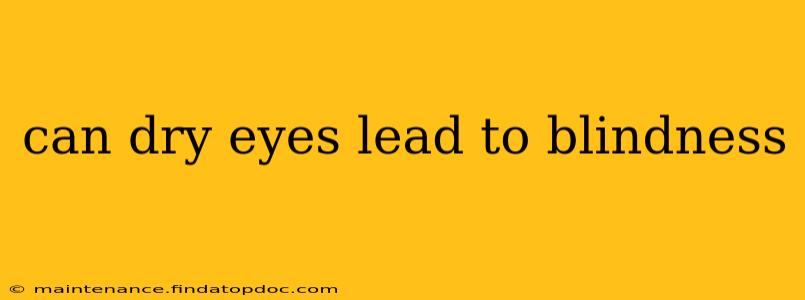Can Dry Eyes Lead to Blindness? Understanding the Risks and Realities
Dry eye syndrome, a common condition affecting millions, is characterized by insufficient tear production or poor tear quality. While it's rarely mentioned in the same breath as blindness, the question of whether dry eyes can lead to blindness is a valid one, requiring a nuanced understanding of the condition's potential complications. The simple answer is: no, dry eyes themselves do not directly cause blindness. However, the persistent discomfort and damage they can cause could, in severe cases, indirectly contribute to vision problems.
Let's explore this further by addressing some frequently asked questions surrounding dry eyes and vision:
Can severe dry eye damage your eyesight?
While dry eyes won't directly cause blindness, severe, untreated dry eye can significantly impact your eyesight. The constant dryness and irritation lead to inflammation and damage to the cornea, the eye's clear outer layer. This damage can manifest in various ways, including:
- Corneal abrasions: The dryness can make the cornea more susceptible to scratches and abrasions, leading to pain, blurry vision, and increased sensitivity to light. While these usually heal, repeated abrasions can increase the risk of more serious complications.
- Corneal ulcers: In severe cases, prolonged dryness can lead to corneal ulcers, which are open sores on the cornea. These are serious and require immediate medical attention to prevent scarring and vision loss.
- Reduced visual acuity: The inflammation and damage associated with severe dry eye can reduce the sharpness and clarity of vision. This is often temporary but can become permanent if left untreated.
It's crucial to understand that these complications, while potentially severe, are indirect consequences of dry eye, not a direct path to blindness. Effective treatment can usually prevent these issues from escalating.
What are the long-term effects of untreated dry eyes?
Untreated dry eyes can lead to a cycle of irritation and inflammation that progressively worsens the condition. The long-term effects can include:
- Chronic eye pain and discomfort: Constant dryness and irritation can significantly impact quality of life.
- Increased risk of infection: A dry cornea is more vulnerable to infections, which can further damage the eye.
- Vision impairment: Blurred vision and reduced visual acuity are common long-term effects of untreated dry eye.
- Corneal scarring: Severe inflammation and repeated damage can lead to permanent scarring of the cornea, which can affect vision permanently.
This highlights the importance of seeking professional help if you experience persistent dry eye symptoms. Early intervention can prevent these long-term complications.
Can dry eye cause permanent vision loss?
While dry eyes themselves don't directly cause blindness, the damage caused by severe, untreated dry eye can potentially lead to permanent vision impairment. Corneal scarring from ulcers or chronic inflammation is a primary concern. However, this is avoidable with proper diagnosis and treatment.
How is dry eye diagnosed and treated?
A comprehensive eye exam by an ophthalmologist or optometrist is essential for diagnosing dry eye. This usually involves assessing tear production, tear quality, and examining the surface of the eye for signs of inflammation or damage. Treatment options vary depending on the severity of the condition and may include:
- Artificial tears: These lubricate the eyes and provide temporary relief.
- Prescription eye drops: These address underlying issues like inflammation or tear production deficiencies.
- Punctal plugs: Small devices inserted into the tear ducts to slow tear drainage.
- Lifestyle changes: Adjusting environmental factors like screen time, air conditioning use, and diet can significantly help manage symptoms.
Remember, prompt diagnosis and consistent treatment are key to preventing the potentially severe consequences of dry eye and preserving your vision. Don't hesitate to consult an eye care professional if you are experiencing persistent dry eye symptoms.
Disclaimer: This information is intended for educational purposes only and should not be considered medical advice. Always consult with a qualified healthcare professional for any health concerns or before making any decisions related to your health or treatment.
